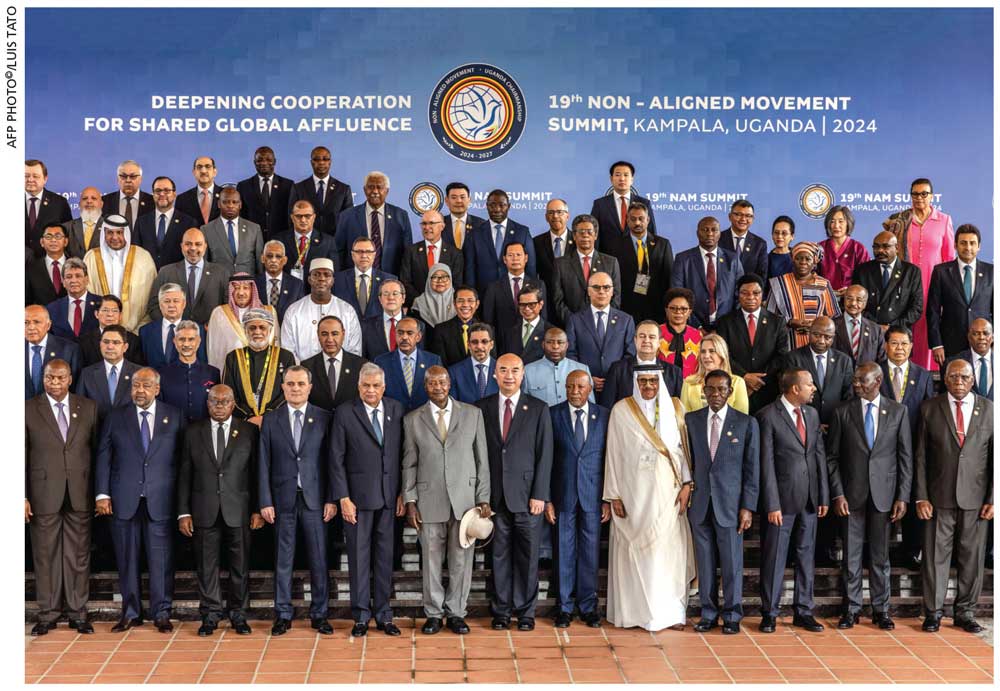GLOBAL SOUTH MARCHING ONWARD
Sri Lanka shows how the Global South can assert itself – Dr. Jehan Perera
A photograph of the leaders of the Non-Aligned Movement (NAM) shows Sri Lanka’s President Ranil Wickremesinghe in the front row, next to the host Uganda’s President Yoweri Museveni. Wickremesinghe delivered a speech at the summit that could be a trend-setter and garner respect of world leaders gathered in Kampala.
In his speech, Wickremesinghe dealt boldly with two central issues of concern to developing countries. He took on the issue of the war in Gaza and the continued domination of the Global South by the Global North.
He pointed to the humanitarian crisis in the Gaza Strip and with his experience of coping with the civil war in Sri Lanka, Wickremesinghe noted: “In line with multiple UN resolutions, and the declaration of this summit, the international community must recognise the West Bank, Gaza and East Jerusalem as territories coming within the State of Palestine; and in addition, there should be no change in the ethnic composition of Gaza.”
Wickremesinghe’s words will do much to assuage Muslim sentiment in the aftermath of his controversial decision to send a Sri Lankan naval warship to the Red Sea to join the international naval force led by the US.
The decision to send a Sri Lankan navy vessel to assist in protecting the freedom of the seas resulted in all the Middle Eastern ambassadors in Sri Lanka meeting with the president.
There have also been expressions of concern that the high cost of the operation is unaffordable to a country where more than a quarter of the population is reportedly living below the poverty line. In addition, there is an element of disregard for the sentiments of the Muslim population here in Sri Lanka, which is emotionally supportive of the Palestinian cause.
It is significant that neither the government nor Wickremesinghe has backtracked on the naval mission to the Red Sea. But then again, it appears that the president has covered his bases. The second half of his speech at the NAM summit was as compelling as the first.
Wickremesinghe made a claim for intellectual leadership by the nonaligned group of countries. He spoke stirringly about the North-South divide and the need for the Global South to assert itself.
“Our membership today is no longer a grouping of weak states. We must recognise that as a result of the rapid progress and economic advancement of some Asian, African and Latin American states, most of the 10 leading economies of 2050 will belong to this movement. We see among us rising aspirants for leadership status in global affairs. They must be prepared to give leadership,” he asserted.
In making his presence felt in Uganda, the Sri Lankan president would have also been mindful that among the countries present, whose support he would be counting on, almost half were from the African continent.
In March and again in September this year, Sri Lanka will appear before the UN Human Rights Council (UNHRC) in Geneva for discussion regarding its implementation of Resolutions 46/1 and 51/1 on the theme of ‘Promoting reconciliation, accountability and human rights in Sri Lanka.’
Since the civil war ended in 2009, the country has been subjected to strictures by the UNHRC. It was able to prevail only once when its diplomats managed to convince the countries of the Global South that Sri Lanka was sincere in addressing its postwar issues.
But thereafter, Sri Lanka has lost every single vote due to non-implementation of the promises it made then and subsequently.
Presently, Sri Lanka has many promises to keep in terms of postwar justice. After Wickremesinghe’s lobbying effort in Uganda, it is possible that Sri Lanka will once again – as in 2009 – be able to persuade a majority of countries in the UN Human Rights Council to trust its commitment to justice and reconciliation, and end their surveillance through United Nations mechanisms.
However, the true test for the government lies in gaining the trust and confidence of the Sri Lankan people. The recent election in the main Tamil political party – the Ilankai Tamil Arasu Kachchi (ITAK) – that resulted in a victory for the candidate espousing Tamil nationalism suggests that more efforts are needed to secure lasting success.






